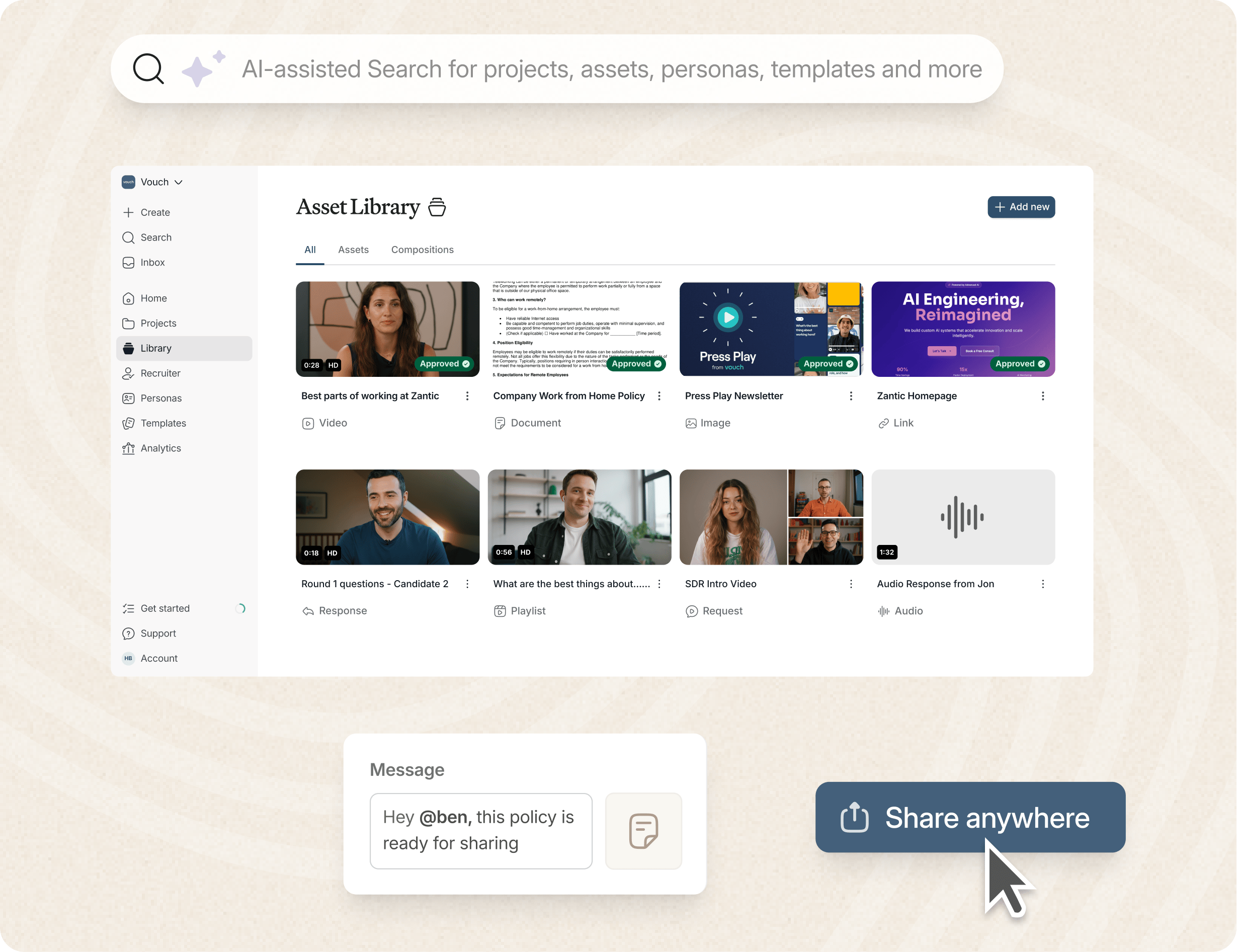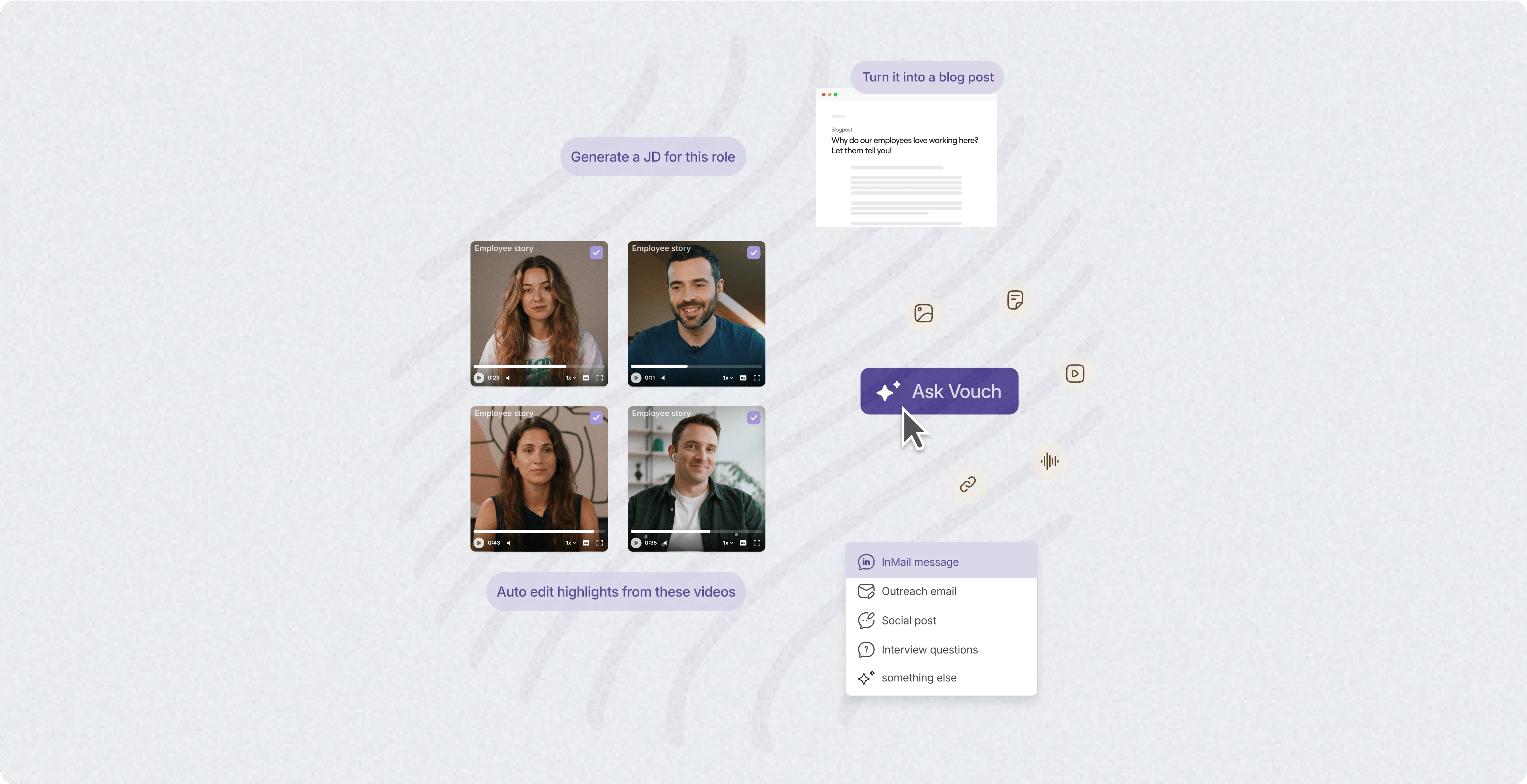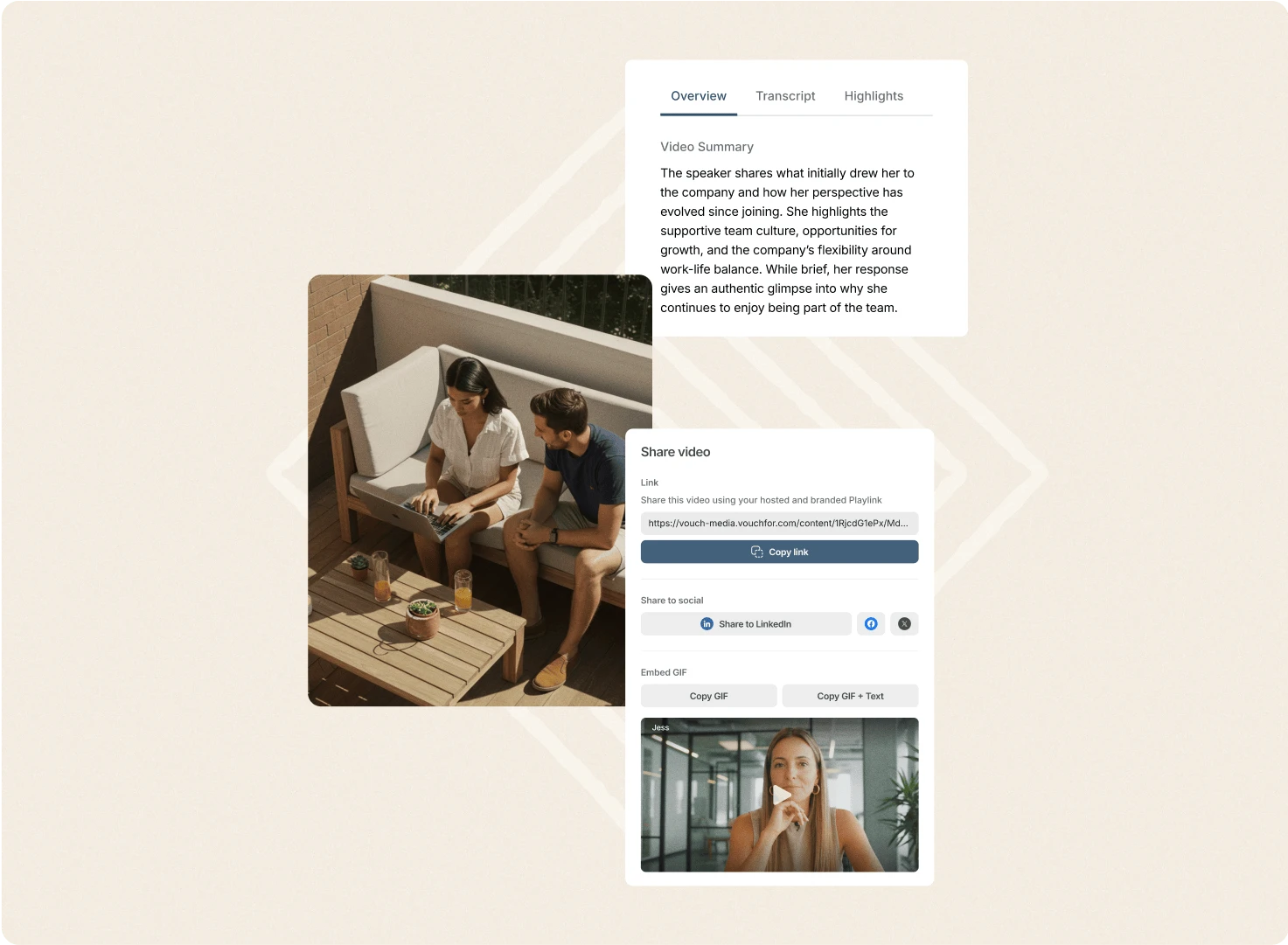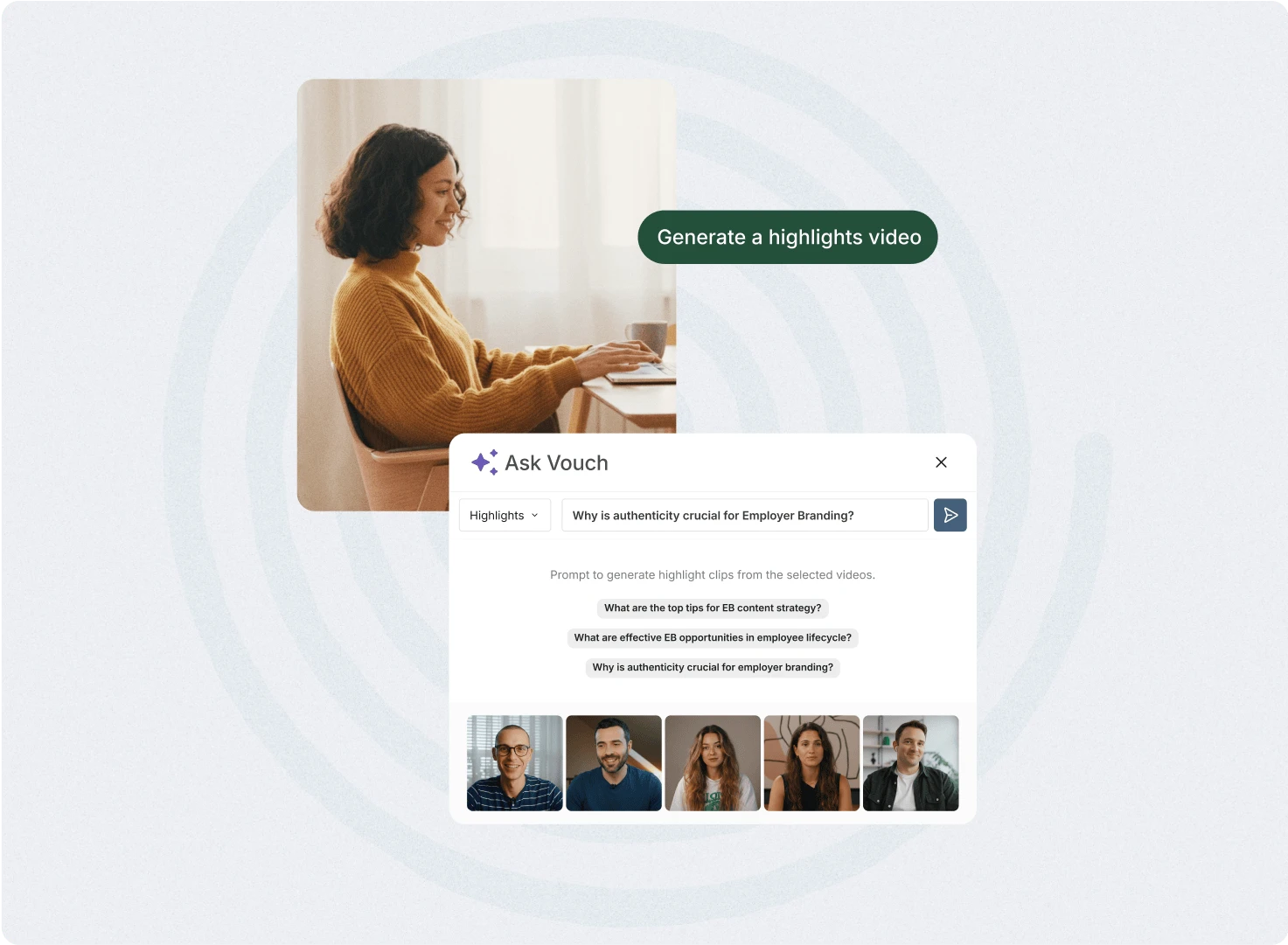The tourism industry was one of the hardest-hit sectors during the COVID-19 crisis, with widespread layoffs, loss of trust, and rising concerns around job stability.
Now in 2026 as the sector is still recovering in many parts of the world, building a strong employer brand has become essential to attract and retain potential employees and regain credibility as an employer of choice.
A well-crafted employer branding strategy is more than marketing - it’s how tourism companies define their culture, value, and purpose in the eyes of prospective employees.
So, let's unpack the seven employer branding strategies that work in tourism today:
1. Lead with Real Stories Using Vouch
Let’s start where real branding begins — your people.
Vouch is a video platform used by leading tourism and hospitality industry brands to highlight employee experience through short, genuine interviews.
With Vouch, companies can:
- Collect colleague-generated content (real stories from real people)
- Share across social media platforms, job ads, and company websites
- Showcase your inclusive culture, frontline heroes, and unique workplace vibe
This is especially powerful in the field of tourism, where your people are your product.
Employee testimonials give potential candidates a glimpse of your corporate culture beyond the polished brand photos.
Companies using employee video content see up to 3x more engagement from job seekers, according to LinkedIn's 2023 Talent Trends Report.
2. Define Your Employer Value Proposition (EVP) Clearly
Your employer value proposition isn’t just about perks — it’s the emotional and functional benefits of working at your company.
In the tourism sector, this means promoting:
- Career development opportunities in international settings
- Strong company values, like social responsibility
- Flexible work models for better work-life balance
- Safe, resilient environments where employees can grow
The AI-enabled workspace for talent teams.
- Unified workspace for talent teams
- Accelerate hiring with AI tools
- Auto-generate polished hiring and employer brand content
- Easily repurpose assets across all channel

3. Offer Career Pathways to Build Trust and Retention
One of the key negative impacts of the pandemic was a loss of career security.
Now, tourism companies must offer structured, visible advancement opportunities to rebuild loyalty.
To do this:
- Map out clear promotion paths (e.g. receptionist → concierge → guest experience manager)
- Highlight mentorship and professional growth stories
- Communicate training and additional insight programs during recruitment
Research published in the International Journal of Contemporary Hospitality Management found that employers offering structured growth paths reported lower employee turnover and better retention post-COVID.
4. Engage Employees as Brand Ambassadors
Your current employees are your best recruiters.
By empowering them to share their experiences, you tap into authentic insight that builds a positive brand image.
How to activate this strategy:
- Encourage social media posts featuring behind-the-scenes work
- Create internal awards or recognition for standout contributions
- Use your communication channels to share “A Day in the Life” blog posts or videos
A 2024 study in the Journal of Tourism and Services revealed that branding in tourism is most effective when it reflects the role of employees in real time.
5. Create a Culture of Open Communication
Transparent internal communication can improve trust and decrease labour turnover — especially when teams feel heard and seen.
What you can do:
- Set up company-wide communication channels for team updates
- Collect frequent channel of feedback from frontline and office staff
- Promote open sessions with HR or leadership for Q&A
According to Backhaus & Tikoo's 2004 study, successful employer brands are co-created with employees — not imposed from above.
This becomes even more crucial in the hospitality sector, where teams work across time zones and environments.
6. Promote Social Responsibility and Community Impact
Post-pandemic job seekers want to work for companies that care.
Embedding social responsibility into your employer brand helps build an attractive employer profile.
Ideas for action:
- Partner with local tourism recovery programs
- Support sustainability in travel and green certification
- Offer travel incentives for staff engaged in community involvement or volunteering
7. Continuously Audit and Adapt Your Brand Messaging
Your employer branding process should evolve with market trends and employee expectations.
Regular checks of employer brand effectiveness can prevent disconnects between brand promise and employee reality.
Here’s how:
- Use spotlight surveys and interviews to assess the employee experience
- Monitor reviews on platforms like Glassdoor or Indeed
- Align your employer brand promotional plan with feedback from the ground up
According to Barrow & Mosley (2005) and Ambler & Barrow (1996), your employer brand image must be reviewed in context — particularly during times of crisis or recovery.
Summary
The path to becoming a strong employer isn’t about superficial branding — it’s about rebuilding trust, offering purpose, and communicating consistently with your team and your market.
By focusing on real employee stories using tools like Vouch, investing in structured development, and prioritizing values-driven branding, tourism companies like yours can gain a competitive advantage.
Done right, your open positions can become more than a job, it becomes a place where employee engagement, growth, and belonging thrive.
FAQs
What is employer branding in tourism?
It’s how tourism companies attract, engage, and retain talent by promoting their values, culture, and benefits.
Why is employer branding important post-COVID?
Because job seekers now prioritize safety, growth, and purpose after the disruption of the pandemic.
What is the role of EVP in tourism?
A clear employer value proposition helps differentiate you from competitors and builds loyalty.
How can companies reduce employee turnover?
By offering structured career development, transparent communication, and flexible incentives.
What tools support employer branding in tourism?
Platforms like Vouch, LinkedIn, and internal feedback systems help amplify your employer brand.
How do I make my brand attractive to new employees?
Focus on values, share authentic employee stories, and demonstrate your impact on community and environment.
Create Effective Employer Branding Videos With Vouch
Loved by companies like Canva, Nike, Cisco, HubSpot, Amazon, and more, tools like Vouch make leveraging video for employer branding remarkably easy.
Book a Vouch demo today and chat with a video content marketing expert.
You might also like

Elevate Your Brand Today With Vouch
Discover how Vouch can accelerate talent acquisition while helping you stay on-brand.






